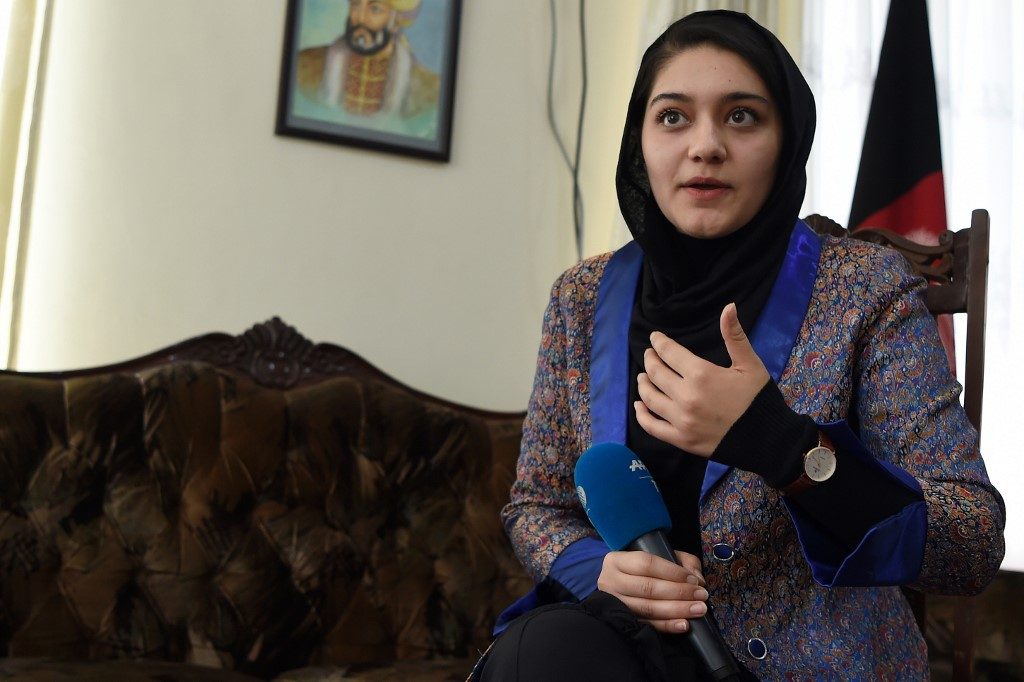SUMMARY
This is AI generated summarization, which may have errors. For context, always refer to the full article.

KABUL, Afghanistan – Afghanistan’s ruling elite and international power brokers must listen to the fast-growing youth population – including junior Taliban members – if the war is ever to end, the country’s new youth delegate to the United Nations says.
In a nation at war for 40 years and where two-thirds of the population is aged 24 or under, twenty-year-old Aisha Khurram says the younger generation’s concerns have been shunted aside even as they inherit the conflict.
“For decades and even centuries, our fears and future have always been decided by the warring parties, irrespective of our perspective, irrespective of our opinions and our part in the process,” Khurram told AFP in the UN’s Kabul compound.
The international relations student at Kabul University was picked from 100 candidates for her high-profile role in early October, at the end of a tough selection process.
For Khurram, reaching out to all young Afghans – including those joining the ranks of the Taliban insurgency – is critical.
“Before they join the militant groups… we have to make the opportunities for them,” she said.
“We have to hear their voices, we have to consider their right for education, their right for work opportunities and their right for life,” she added.
“My own peer groups… do not enjoy the access to education, do not enjoy the opportunities that we have right now in Afghanistan.”
Afghanistan’s mainstream media – concentrated in Kabul – only reflect the views of urban Afghans she said, effectively blacking out opinions of vast swathes of the country, especially young people.
“It’s not inclusive”, she said.
She offered the #MyRedLine social media movement as an example in which young Afghans – mostly educated – state the “red line” they are not prepared to see Afghanistan cross in any eventual peace deal with the Taliban.
The campaign is “ignoring the needs and demands of the Afghan youth that are living outside of the Kabul (region),” she said, noting their urgent need for security trumps many “secondary” rights.
Global youth
Khurram, who was born in Pakistan after her family fled violence in Afghanistan, came of age at a time when the gruelling conflict is worsening.
According to the UN, the period of July to September this year was the deadliest on record for civilians, with more than 2,500 killed.
With half of the world’s population now aged under 25, the UN is trying to amplify young voices at major summits through a youth delegation programme.
Countries can select representatives to advocate on several priority areas including the environment, juvenile justice and employment. But for Khurram, the key issue is peace.
She first went to Afghanistan in 2004, three years after the US-led invasion to topple the Taliban and hunt for Al-Qaeda leader Osama bin Laden.
In recent years the security situation has only deteriorated, and the US spent the past year pushing for a deal with the Taliban that would have seen the Pentagon pull thousands of troops from Afghanistan in return for security guarantees.
But President Donald Trump nixed talks last month as Taliban attacks continued.
Khurram said many Afghans were suspicious of the negotiations, which cut out the government of President Ashraf Ghani, who is currently seeking election for a second term.
“There are 3 parties in the conflict, and only two of them now are engaged in negotiations,” she said. “Afghan people deserve to be a part of this process.”
Afghans under 18 make up around half the estimated population of 37 million, but Afghanistan’s political class does not reflect the country’s youth.
A grizzled crew of old-school warlords and bickering elders still dominate the political scene, focused on consolidating power instead of strengthening national governance.
Khurram said she is helping to organize a “youth jirga” — a meeting in which young people from all over the country can come together and brainstorm ways to influence any peace process. – Rappler.com
Add a comment
How does this make you feel?
There are no comments yet. Add your comment to start the conversation.